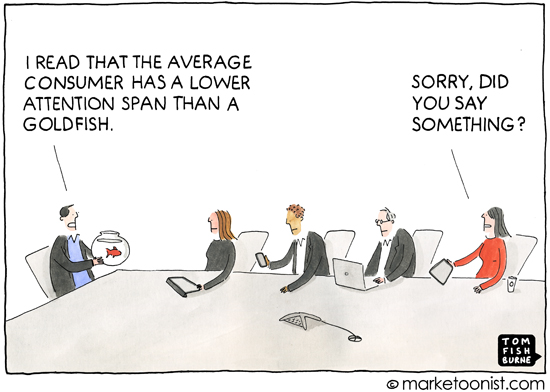I’ve got you for no more than 30 seconds!
That’s the data for our attention span for screen time. For blog posts, I have to reduce my verbosity to 400-600 words and give you two images to allow your brains to “rest” to process the information I have shared.
It’s stunning how our abilities to pay attention are plummeting! We are surrounded by too many things whose primary purpose is to distract us!
In a world of constant distraction, how do we learn to focus and pay attention?
As we work with others, how do we focus our collective attentions?
We cannot address the real challenges we, our organizations, and our customers face in 30 second increments. Given the realities of what we each face, how do we catch our own, and other’s attention?
While I’m exercising (or perhaps exorcising) my odd humor in this post, the reality is our collective inability to pay attention limits our ability to get things done, and limits our potential!
I’m interested in turning this to a discussion, not reiterating the problem, but learning what people are doing to increase their abilities to pay attention, to be engaged? What’s working individually? What’s working as you engage in groups?
Please add your ideas in the comments. I’ll do another post leveraging your suggestions. Thanks for your help!
I know this is supposed to be 400-600 words according to the new “inattentiveness standards.” I’m 162-362 short. Enjoy the gift 😉


As an old fart (about to turn 80), I beleive it’s because there are too many distractions, and for some reason younger people don’t seem to understand the meaning of rudeness.
I see younger people sitting together, and they don’t talk to each other, because they’re too busy looking at their phones, as if something outside of their current group is more important than being within that group, and talking with those people.
And then they go home and phone those people to find out what they’ve been doing. Idiocy!!
if that doesn’t change, ignorance will flourish because nobody is actually paying attention to anyone else.
Ian, as another old fart, it is so disappointing to see this.
The void in pot can be filled either by a continuous stream or by a drip which can be compared to span of attention continuous and intermittent
The pot is removed either when it is filled or the stream of inflow stops that is decision point.
At the point of decision the pressure of urgency or circumstances compel action based on the available information.
In such situation the decision can be right or wrong. One has to bear with consequences. Based on experience of such decisions the wisdom develops
In the 80’s we asked for an hour.
Established needs, Decision Making Criteria, and made an outline proposal.
Of course there was due diligence, site surveys, etc.
But, all I was ever able to do in 30 secs was make an Initial ‘benefit’ Statement,
and ask for the one hour appointment. The one hour appointment began with repeating the IBS, and asking permission to ask questions, in order to tailor the offer.
Great little discussion on
https://www.apa.org/news/podcasts/speaking-of-psychology/attention-spans
well you got 6 mins of my attention, well done Dave.
Great insight Brian. I used to think, “In this 5 minutes, I have to justify the next 15 minutes.” And in that meeting, I thought, “This 15 minutes will justify the next 30 minutes…..” Ultimately, I earn the right to their continued attention in every meeting.
As Dave knows, this. Is not an entirely new issue. Here’s Seneca in a treatise from the first century AD:
“No activity can be successfully pursued by an individual who is preoccupied … since the mind when distracted absorbs nothing deeply, but rejects everything which is, so to speak, crammed into it.”
Love the quote Ned!
💡Thinking/writing about “attention spans since mid 2010’s: For me it starts with recalibrating our value system and prioritising the quality of any human interaction over handling hugh amounts of quick digital data/responses.
😀Suddenly we realise that it’s not ticking off to-do-lists but listening with empathy enriches our life.
And attention beyond seconds is possible through deep emotional bonding.
Klaus, this is so important, but we tend to ignore it.